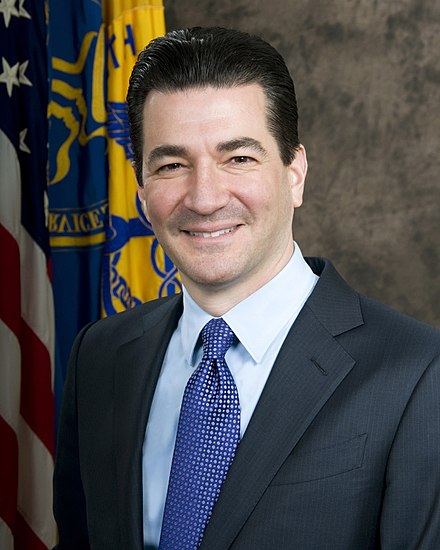A topline report from the Council for Responsible Nutrition (CRN),
the leading trade association for the dietary supplement and functional food industry
FDA reiterates CBD-containing food and supplements are ‘unlawful’; Commits to exploring ‘pathways’ to lawful marketing of these products
FDA Commissioner Scott Gottlieb, M.D., issued a statement Dec. 21 reiterating FDA’s views that “it’s unlawful under the Federal Food, Drug, and Cosmetic Act (FD&C Act) to  introduce food containing added CBD or THC into interstate commerce, or to market CBD or THC products as, or in, dietary supplements, regardless of whether the substances are hemp-derived.” The statement was issued contemporaneously with President Trump’s signing of the 2018 Farm Bill, which includes provisions removing hemp from the definition of marijuana in the Controlled Substances Act. Removing hemp and its non-THC constituents from the definition of marijuana in Schedule I of the Controlled Substances Act clears a significant hurdle on the path to legal marketing of cannabidiol (CBD), but FDA’s public statement reiterates FDA’s previously announced perspective that CBD-containing products may not be sold as food or dietary supplements.
introduce food containing added CBD or THC into interstate commerce, or to market CBD or THC products as, or in, dietary supplements, regardless of whether the substances are hemp-derived.” The statement was issued contemporaneously with President Trump’s signing of the 2018 Farm Bill, which includes provisions removing hemp from the definition of marijuana in the Controlled Substances Act. Removing hemp and its non-THC constituents from the definition of marijuana in Schedule I of the Controlled Substances Act clears a significant hurdle on the path to legal marketing of cannabidiol (CBD), but FDA’s public statement reiterates FDA’s previously announced perspective that CBD-containing products may not be sold as food or dietary supplements.
 In the statement, Dr. Gottlieb reiterates FDA's position that "Congress explicitly preserved the agency’s current authority to regulate products containing cannabis or cannabis-derived compounds under the FD&C Act and section 351 of the Public Health Service Act." He continued, “Both CBD and THC are active ingredients in FDA-approved drugs and were the subject of substantial clinical investigations before they were marketed as foods or dietary supplements. Under the FD&C Act, it’s illegal to introduce drug ingredients like these into the food supply, or to market them as dietary supplements.”
In the statement, Dr. Gottlieb reiterates FDA's position that "Congress explicitly preserved the agency’s current authority to regulate products containing cannabis or cannabis-derived compounds under the FD&C Act and section 351 of the Public Health Service Act." He continued, “Both CBD and THC are active ingredients in FDA-approved drugs and were the subject of substantial clinical investigations before they were marketed as foods or dietary supplements. Under the FD&C Act, it’s illegal to introduce drug ingredients like these into the food supply, or to market them as dietary supplements.”
FDA also offered that “there are pathways available for those who seek to lawfully introduce thee products into interstate commerce” and acknowledged that the agency has the authority to permit such use of CBD in food or supplements. Gottlieb committed FDA to hold a public meeting “in the near future” on the topic and to explore these “legal pathways” with interested stakeholders. CRN has communicated directly with FDA about achieving a means of lawful marketing of CBD and other cannabinoids. For more information, contact Megan Olsen at MOlsen@crnusa.org.
RETAILER ALERT: Illicit ingredient poses dire risk to consumers
CRN has alerted retailers tothe dangers of phenibut, a substance found in products fraudulently marketed as dietary supplements. Taking action to protect consumers, CRN, the American Herbal Products Association (AHPA), the Consumer Healthcare Products Association (CHPA), and the United Natural Products Alliance (UNPA) recently issued a call to action for FDA, demanding the immediate removal of products containing phenibut from the market. CRN also issued a public service announcement to help consumers make smart, safe supplement purchasing decisions.
Developed as a drug in the former Soviet Union for its supposed brain-enhancing properties, phenibut is not an approved drug in the United States, nor does it meet the regulatory requirements to be sold in, or as, a dietary supplement. Retailers of dietary supplements, including online retail portals, should refuse to stock or sell any product containing phenibut.
Positive findings in VITAL study support supplement use
Results of the highly anticipated VITAL study reveal positive secondary findings that reaffirm the safety and benefit of vitamin D and omega-3 fatty acids. Launched in 2010, VITAL is an ongoing randomized clinical trial monitoring 25,871 U.S. men and women. The study’s aim is to determine whether taking daily vitamin D3 (2000 IU) or omega-3 fatty acid supplements reduces the risk of developing cancer, heart disease, or stroke in people who do not have a prior history of these illnesses.
Although the study found no significant effects on the primary outcomes of invasive cancer incidence or major cardiovascular events, CRN points to several positive findings from the study that demonstrate the benefits of omega-3 and vitamin D supplementation in additional analyses. While early media coverage focused on disappointing topline results, CRN highlights positive secondary findings including:
- Almost a 30 percent reduction in heart attacks in the fish oil group compared with placebo.
- A 40 percent reduction of heart attacks in fish oil groups who had less than 1.5 servings of fish per week, with even more dramatic impacts among African-Americans.
- Reduction in the rate of cancer deaths two or more years later in people who took vitamin D.
CRN cautions that the VITAL trial examined therapeutic endpoints with drug-like expectations and that VITAL results do not change decades of research showing how critical vitamin D and omega-3 supplementation are for overall health. Click here to read CRN’s full summary of the VITAL study and its implications for industry and consumers.
CRN applauds FDA enforcement, warns retailers of illegal products containing tianeptine
Taking action to protect consumers, FDA recently issued Warning Letters to two companies illegally marketing products containing tianeptine as dietary supplements. In a new notice, “FDA Takes Action on Products Marketed as Dietary Supplements Containing Tianeptine and Warns Consumers,” the Agency noted that consumers“should avoid all products containing this ingredient, especially those claiming to treat opioid use disorder.”
CRN fully supports FDA’s enforcement actions against unlawful companies and reminds consumers that dietary supplements provide benefits that promote better health and wellness, but do not treat opioid addiction. The association previously alerted consumers that there is no mainstream research supporting using a dietary supplement to treat opioid addiction, and the law does not allow marketers of dietary supplement products to make treatment claims.
#MyYearSupplemented campaign amplifies the role of supplements for year-long health
This fall, CRN partnered with Clever, an influencer marketing agency, to launch the #MyYearSupplemented campaign. Featuring supplement-using influencers who work with children, content communicated the importance of wellness and self-care throughout the school year, with a prominent focus on dietary supplements as part of a healthy lifestyle.
 The campaign concluded late last month and resulted in an impressive 13.4 million impressions and several thousand social media engagements. As part of its Alliance Building initiative, CRN works with influencers to spread positive messaging about dietary supplements and encourage safe, responsible supplement use. See the list of participating influencers and link through to their content below.
The campaign concluded late last month and resulted in an impressive 13.4 million impressions and several thousand social media engagements. As part of its Alliance Building initiative, CRN works with influencers to spread positive messaging about dietary supplements and encourage safe, responsible supplement use. See the list of participating influencers and link through to their content below.
- Sixth Bloom, “Impact Others by Taking Time for Yourself”
- The Nutritionist Reviews, “5 Tips for Staying Healthy When Life Gets Busy”
- Lovebugs & Postcards, “Staying on Top of My Game During the School Year”
- Sunny Day Family, “How to Avoid Parent Volunteer Burnout this School Year”
- Mom Unleashed, “How I Teach My Kids Healthy Habits”
- Whimsical September, “Our Back-to-School Daily Rhythm”
- The Staten Island Family, “Tips to Be Your Best Self”
- Grits & Grace “Why Maintaining My Health for the Sake of My Family is Important”
- Sunny Sweet Days, “How to Feel Better Every Day: Simple Swaps for Your Everyday Routine”
- Beyond Fit Mom, “3 Ways to Stay Healthy During the School Year”
- Life Anchored, “Healthy Body Learning Unit for Preschoolers”
- A Time Out for Mommy, “Avoiding Burnout During the School Year”
- Busy Mommy Media, “How to Avoid Burnout During the School Year”
- Real Food with Dana, “Top Tips for Managing Stress and Staying Healthy Throughout the Year”


